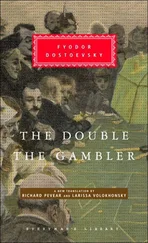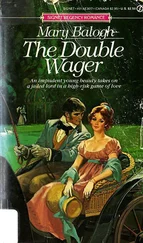Terrance Leckbruge had told her that she would know him because he would be reading the Atlantic . She decided the moment she walked into the wine bar that she would have picked him out anyway. He was sitting atop a tall stool when she arrived, a glass of something white and a well-thumbed copy of the magazine on the circular table before him. He looked about forty, but she wouldn’t have been surprised if he was considerably older than that: His hair, slicked back with a heavy gel, was so black that she was quite sure he had colored it. He was wearing the sort of oddly dated eyeglasses that she expected to find on senior citizens: rhombic-shaped spectacles the color of mustard. The glasses were particularly unnerving because his eyes were a dazzling, Day-Glo blue, and his nose was so petite that it was practically nonexistent. She almost wondered whether he epoxied his spectacles to his eyebrows to keep them from sliding off his face, especially since he was, when she saw him for the first time from the wine bar’s front entrance, peering down at that magazine, his head slightly bowed, his mouth frozen in a vaguely condescending smirk. He was wearing a gray linen jacket with a beige T-shirt underneath it, and Laurel felt more than underdressed in her jeans: She felt slovenly. She hadn’t washed her hair or showered in a day and a half, and she realized that she was wearing the same clothes she had put on Friday morning before leaving for BEDS. She also wasn’t wearing any makeup, and she wished at the very least that she had layered on some lipstick and blush.
Leckbruge glanced up as she approached the table, and then slid off the stool to his feet. She thought for a brief moment that he was actually going to try to kiss her cheek, but she was mistaken: He simply leaned in a little closer than most people when he shook her hand.
“You must be Laurel. I’m Terrance Leckbruge, but my friends all call me T.J. They always have, they always will-even if, God willing, I make it to a very old man. Thank you so much for dropping by. Now, you look like you are in serious need of a drink.” His accent was lovely in person, even more southern and pronounced than when he’d spoken with her on the phone. She wondered if it was an affectation, but she didn’t care. It still sounded nice.
“I am,” she agreed, and she reached for the burnished metal clipboard with the calligraphed list of wines. He must have sensed that she was in way over her head, because he quickly recommended one. Then, when the waitress arrived, he ordered it for her, sparing her from having to wrap her tongue and mouth around the name of an unpronounceable Tuscan vineyard.
For a few minutes, they discussed how much they loved Vermont ’s quirks and eccentricities, and he told her how he savored the kindness of his neighbors in Underhill. She grew silent when he brought up the town, and it crossed her mind that he might interpret that quiet as coldness-which was fine with her. As soon as her wine arrived, he said, “Really, Laurel, I am so appreciative that you’re willing to see me on such short notice. Truly I am. Thank you.”
“Well, I have to admit: If I hadn’t been trying to get out the door quickly this morning, I probably would have said no. But I didn’t want to argue with you.”
“And so you said yes.”
“That’s right.”
“I can be very persuasive,” he said, resting his chin on his knuckles.
“Not this time.”
“And persistent.”
“That’s more accurate.”
“Well, I am grateful that you have been so accommodating.”
She shrugged noncommittally.
“Where were you today?” he asked. “What was the engagement that was so pressing? May I ask?”
She considered lying, but saw no need. “I wanted to get to the darkroom to work on Bobbie Crocker’s negatives. See what’s there.”
“And?”
“And I saw absolutely no more images of your client, if that’s what you’re wondering.”
“Her house? Her property? Any pictures like that?”
“Look, I shouldn’t even be here.”
“But you are. Imagine if some individual-a profoundly ill individual-somehow took possession of your family’s photographs. Deeply personal images. Wouldn’t you want them back?”
“Bobbie Crocker’s schizophrenia was under control. You make him sound deranged.”
“We don’t need to parse mental illness. He was homeless until your group parachuted into his life. I do not believe reasonable senior citizens live on the street in northern Vermont when they have a choice.”
“As soon as BEDS gave him the chance to come in off the street, he took it.”
Leckbruge swallowed the last of his wine and motioned for their waitress. When she returned to their table, he purred, “This was scrumptious. Every bit as exquisite as you’d said. May I have another, please?”
The waitress had the sort of twin piercings along her left eyebrow that Laurel found painful to look at, especially since otherwise her young skin was as smooth as a model’s in a face crème commercial. A lot of Laurel ’s acquaintances had small piercings and tattoos-even Talia had pierced her navel. Once, soon after graduating, she had toyed with the idea of following Talia’s lead and piercing her belly button, too. Piercing one’s navel, she knew, was a lot like the decision to pose nude for erotic photographs: It was best done well before you hit middle age. And so it had seemed to Laurel that if she were going to do it, she should do it sooner rather than later. Further goading her toward the body-art parlor was her boyfriend-older, as always, who presumed that a loop in her navel would make it even more apparent to the world both what a trophy catch she was and what a stud he was. In the end, however, Laurel decided that she didn’t want to draw attention to her stomach, because then she would risk drawing attention to her breasts. And ever since she had been attacked, that simply had not been an option. Besides, her boyfriend’s immoderate enthusiasm alone was enough to nix the idea.
“So,” Leckbruge said quietly, almost dreamily, when the waitress had left to get him a second glass of wine, “what will it take for you to relinquish the photos? That is, of course, why we’re here. My client feels deeply violated and she would like the pictures back. And, clearly, a part of you understands her deep sense of violation. After all-”
“Why would you think that?” Laurel asked, momentarily afraid that she had read more into his use of the word violation than was there. Here she was presuming that somehow he knew what had occurred years earlier on the outskirts of his little village, when most likely he was simply suggesting that she was a particularly empathetic soul. She was about to apologize, or at least try to write off the stridency of her interruption to a lack of sleep or exhaustion-anything-when he reached across the table and rested a warm, gentle hand atop hers.
“Please, I’m so sorry. I shouldn’t have said that.”
“No, I shouldn’t be so touchy. It’s just that-”
And this time he cut her off: “You were attacked. I understand. I should have used a different word than violation. That was callous of me, and profoundly unthinking.”
And so he did know. And she should have guessed that he did. After all, he had a place in Underhill. He was a lawyer. He probably knew all along what had happened. She quickly took back her hand and reached down for her knapsack, planning to leave. But then an image came to her: the girl on the bike on the dirt road. The photo that Bobbie Crocker had taken.
“When was your client’s brother in Underhill?” she asked.
“My client says her brother died a very long time ago. He-”
She waved him silent, scything a swath through the air with her fingertips. “When was Bobbie Crocker in Underhill?”
Читать дальше












